Changes to a mentor program at Illinois State University will provide deeper support for underrepresented students.
Mentoring and Academic Scholarship Achievement Initiative (MASAI) is a peer mentor program focused on the retention of first-generation, low-income, and historically underrepresented first-year students. The program, offered jointly by Dean of Students and University College, provides current Illinois State students as mentors, assisting new students with the transition into university life.
“Mentoring really helps students feel a sense of belonging at the University, which can boost academics, and create networks,” said Tamekia Bailey of University College. “Our hope is that these networks will also encourage retention—the desire of a student to stay in school.”
In the past, a majority of the applications for the MASAI program stemmed from one agency in Chicago that operates as a pipeline through the public schools to prepare inner-city students for college. Though MASAI served more than 100 mentees last year, organizers found gathering applications through one agency limited the scope of students. “In order for this program to be successful, we need mentors and mentees who can really connect, and that means gathering a larger pool of students while at the same time taking a more targeted approach,” said Associate Dean of Students Renee’ Watson.
For the fall semester, MASAI coordinators are drawing applications from four agencies across the city of Chicago—Noble, Phoenix Pact, One Goal, and Bottom Line. “We’re looking to put MASAI students on a path to being a successful college student, so we are examining more than just collected data that was submitted by students from the university application process,” said Watson, noting students’ needs, goals, and support were explored. “Most of the applicants indicated they wanted to make new connections, gain new study skills, experience campus events, and build relationships with professors. MASAI will give these mentees an opportunity to reach all of these goals and more in their freshman year.”
Bailey noted the program selects students who might not qualify for other services. “These are students who are not part of other communities, like TRiO, yet they still want to learn how to navigate the campus community and take on leadership roles,” she said, adding that MASAI is working with groups like TRiO to examine strategies. “It’s all about collaboration for student success.”
University College plans to add staff that will help support the MASAI program. “This is taking MASAI to another level,” said Watson.

